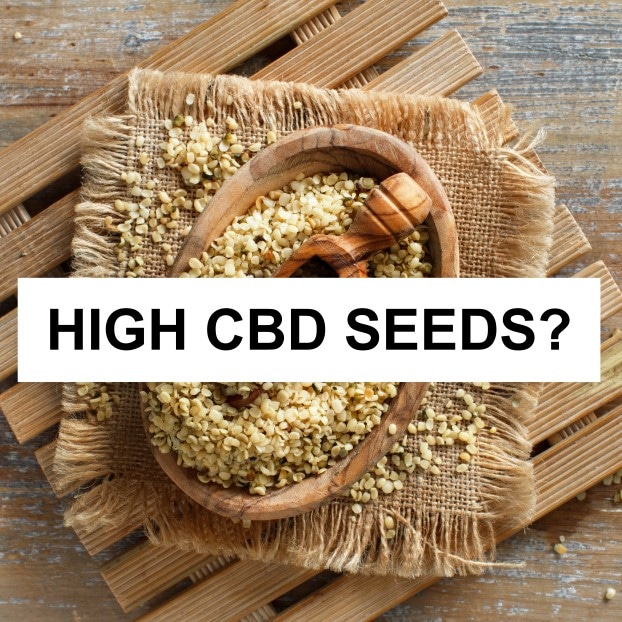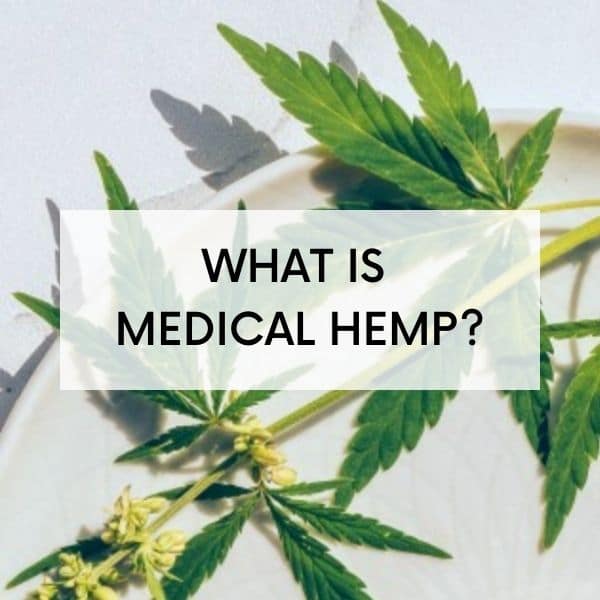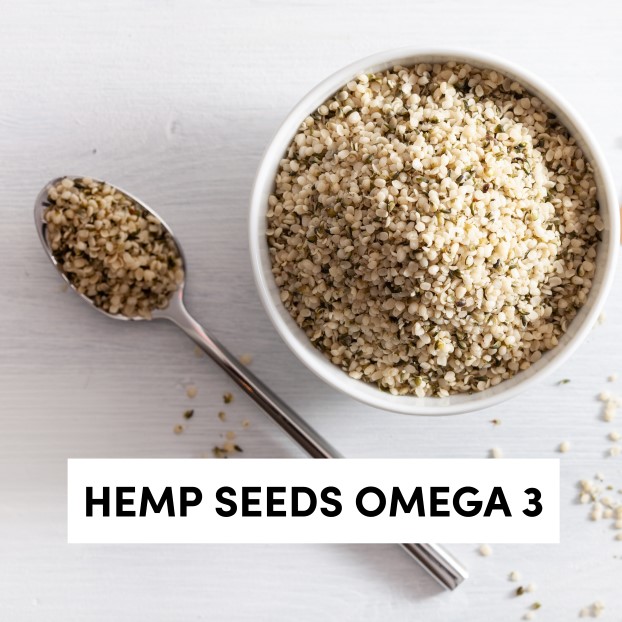High CBD Seeds – Are They Even a Thing?

Posted on May 30th, 2021
Cannabinoids are a group of chemical compounds that occur naturally in the cannabis/hemp plant. The cannabis/hemp plant contains more than 100 Phytocannabinoids identified and characterized structurally so far. These include:
- Tetrahydrocannabinol (THC)
- Cannabidiol (CBD)
- Cannabinol (CBN)
- Cannabichromene (CBC)
- Cannabigerol (CBG)
- And cannabidivarin (CBDV), among many others.
THC and CBD, however, occur in higher concentrations, making them the most abundant of all. They also are the most researched of all, and with good reason.
Tetrahydrocannabinol (THC) is the compound known to cause delusions, change thinking, and even induce hallucinations. It thus is one of the only cannabinoids with psychoactive properties, which might endanger the user in some situations. CBD (cannabidiol) offers a contrast to THC since it packs potent properties that seem to be quite therapeutic to the human body and health.
As a result, CBD oil is one of the most popular products in the health and wellness industry right now. It sees usage to address various conditions, including anxiety, stress, depression, insomnia, pain, seizures, and skin conditions, among many others.

Types Of Cannabinoids
You can classify cannabinoids into three different categories based on their origins. The three groups of cannabinoids include:
Phytocannabinoids: These are the cannabinoids present in the leaves, stalks, seeds, and flowers of the cannabis/hemp plant. CBD is an excellent example of a phytocannabinoid.
Endocannabinoids: Unlike phytocannabinoids, endocannabinoids appear within the body and serve as intercellular lipid messengers of the body. The body synthesizes these cannabinoids on demand and is the key to the functioning of the endocannabinoid system (ECS).
Synthetic Cannabinoids: Simply put, synthetic cannabinoids are human-made cannabinoids made to mimic the properties of endocannabinoids and phytocannabinoids.
Introduction To CBD
Cannabidiol (CBD) is a safe and non-addictive substance/compound commonly found in the leaves, flowers, and stalk of the cannabis/hemp plant. Unlike THC, CBD won’t make you feel intoxicated or stoned. Rather, it packs numerous therapeutic attributes proven to be beneficial for the human body. Unknown to many, CBD may help neutralize or lessen the psychoactive effects of THC.
CBD comes from the leaves, flowers, and stalk of the hemp plant and extracted through solvent extraction. Afterward, manufacturers separate the compound from other cannabinoids to produce pure CBD concentrate. The concentrated CBD isn’t, however, usable/safe on the human body, which is why manufacturers dilute it with a carrier oil. CBD oil is, however, packaged and sold in different presentations depending on the customer’s needs and requirements.
People use CBD in order to get relief from various conditions, including anxiety, chronic pain, depression, inflammation, arthritis, and insomnia. In early studies, the compound also showed effectivity in managing a wide number of medical conditions, including:
- Autoimmune diseases.
- Neurological conditions (multiple sclerosis, etc.)
- Neuropsychiatric illnesses (PTSD, ADHD, alcoholism).
- Gut disorders.
- Skin disease (acne, psoriasis).
- And cardiovascular dysfunctions.
How Does CBD Work?
CBD works by enhancing the efficiency of the endocannabinoid system, or the ECS for short. The ECS is one of the most important receptor systems in the body and responsible for sustaining good health and overall wellbeing. The ECS handles various functions, including:
- Triggering increased metabolism
- Sleep
- Learning
- Reproduction
- Growth and development
- Memory
- And anxiety
How Does The ECS Work Exactly?
It works by regulating the production of hormones, enzymes, and other compounds responsible for maintaining homeostasis. Simply put, the ECS controls everything from the endocrine, brain, and immune systems. Thus, it’s essential to ensure everything works as it should in your body.
Unknown to many, the ECS doesn’t just respond to endocannabinoids but phytocannabinoids as well. The ECS features two major receptors in the body, the CB1 (found in the brain) and the CB2 receptors found throughout the immune system. CB1 receptors mainly congregate in the brain, specifically the amygdala, hippocampus, and hypothalamus. These receptors are responsible for sending signals to the brain; hence they handle pain perception. CB2 receptors are commonly present in the thymus, tonsils, spleen, and immune cells.
CBD locks on onto these receptors (CB1 and CB2) and helps restore or improve the functioning of the endocannabinoid system. Depending on the condition, CBD molecules will bind on the CB1 receptors to help trigger increased production of, say melatonin, for those suffering from sleeplessness or insomnia. CBD will also bind on the same receptors to prevent pain signals from reaching the brain, translating into pain relief. Thus, it especially helpful when dealing with a chronic pain condition or when recovering from an injury.
CBD will also bind to CB2 receptors to help the ECS manage inflammation in various parts of the body. An excellent example of this is using CBD to manage arthritis and arthritic pain. CBD binds on the CB2 receptors to help fight off the inflammation, hence prevent the body from fighting off healthy body cells.
Benefits Of, And Effects Of CBD
1. Anxiety Relief
CBD binds onto CB1 receptors which may help induce a sense of calmness in the brain. For some, this provides almost instant relief from anxiety. In addition to this, CBD might help lower blood pressure spikes associated with anxiety and panic attacks. Thus, helping the user calm off and overcome the anxiety-inducing environment or condition.
2. Anti-seizure
CBD is quite effective in treating various types of epilepsy. According to research and numerous studies, many patients experience fewer and fewer episodes of epilepsy after taking CBD. The FDA also approved Epidiolex, a drug based on CBD, for the treatment of the two types of epilepsy.
3. Neuroprotective
Researchers believe CBD contains neuroprotective properties as well. CBD molecules seemingly bind on CB1 receptors that act on nerves in the brain and form a protective barrier around neurons. CBD also has antioxidative and anti-inflammatory properties that fight off neurodegenerative symptoms as well. Some researchers believe CBD holds the future in treating neurogenerative conditions, including multiple sclerosis.
4. Pain Relief
CBD oil is an effective home remedy for managing chronic pain and similar conditions. CBD works by binding on CB1 receptors, which help inhibit pain signals from reaching the brain. Thus, it can relieve symptoms of chronic pains, arthritis, muscle pains, MS pains, and spinal cord injuries.
High CBD Seeds: What Is Hemp
Hemp, also called industrial hemp, is a variant of the cannabis Sativa characterized by a significantly low concentration of THC. It usually holds less than 0.3% THC. Hemp is, however, grown in controlled conditions to improve concentrations of CBD while inhibiting THC content. Simply put, industrial hemp is a domesticated variety of marijuana.
Chemical Composition of Hemp
Industrial hemp is a potent source of almost all cannabinoids (CBD, CBC, CBG, etc.,) terpenes, and flavonoids. As mentioned before, hemp contains very little to no THC, the reason it was made legal to use and produce under the 2018 farm bill.
Which Parts of Hemp Contain CBD?
Industrial hemp contains a higher CBD to THC ratio than any other variant of cannabis. According to research, the flowers, leaves, and stalks of the herb contain the highest concentration of CBD. Grown in the right conditions, the concentration of CBD can be as high as 80% with minimal amounts of THC.
Are There High CBD Seeds?
While hemp seeds are nutritionally rich, they do not contain any CBD or any other phytocannabinoid. They are, however, rich in essential fatty acids, bioactive compounds, fiber, and other nutritional properties that come in handy when promoting good health. Hemp seed oil is also one of the richest sources of polyunsaturated fatty acids, including omega 6 and omega 3 fatty acids.
What Are Hemp Seeds Good for?
You can either crunch or press hemp seed to produce hemp seed oil. While hemp seed oil may not contain CBD or other cannabinoids, it sure is a rich source of other beneficial nutrients in the human body. Hemp seed oil is particularly rich in high-quality amino acids, unsaturated fats, fiber, mineral salts, and vitamins. Eating them as they are is also a great way to get those compounds.
Benefits Of Consuming Hemp Seeds
Protects The Brain
Hemp seeds have anti-inflammatory and neuroprotective properties potent enough to regulate and protect brain cells from oxidative damage. Consuming hemp seeds might thus help reduce the risk of neurological conditions including Alzheimer’s, Parkinson’s, and multiple sclerosis.
Boosts Heart Health
Rich in omega-3 fatty acids, hemp seeds are good for your heart health. The high levels of arginine in hemp seeds make them a good home remedy for those suffering from high blood pressure.
Reduce Inflammation
The omega fatty acids in hemp seeds can have a direct impact in reducing the risk of inflammation-related conditions. It may, thus, come in handy in managing conditions such as arthritis, type 2 diabetes, and metabolic syndrome.
High CBD Seeds – The Takeaway
While hemp flowers, stalk, and leaves may be rich in CBD, there is no such thing as high CBD seeds. According to research, cannabinoids, or rather phytocannabinoids, are only present in parts of the herb exposed to sunlight. Hemp seeds are, however, an excellent source of hemp seed oil.
Always read the fine print before making an order of your favorite CBD product. It is only by shopping with a certified and trusted supplier like Tanasi.com that you can get high-quality CBD products free of THC. You might also want to consult your doctor before using any of these products, especially if you are already on medication.





